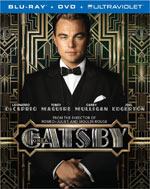

 - for some violent images, sexual content, smoking, partying and brief language.
- for some violent images, sexual content, smoking, partying and brief language.
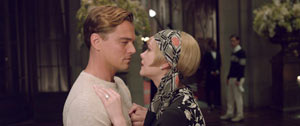
“The Great Gatsby” follows would-be writer Nick Carraway as he leaves the Midwest and comes to New York City in the spring of 1922, an era of loosening morals, glittering jazz and bootleg kings. Chasing his own American Dream, Nick lands next door to a mysterious, party-giving millionaire, Jay Gatsby, and across the bay from his cousin, Daisy, and her philandering, blue-blooded husband, Tom Buchanan. It is thus that Nick is drawn into the captivating world of the super-rich, their illusions, loves and deceits. As Nick bears witness, within and without the world he inhabits, he pens a tale of impossible love, incorruptible dreams and high-octane tragedy, and holds a mirror to our own modern times and struggles.
(Warner Bros.)
If you're unfamiliar with the actual story of The Great Gatsby, it's likely that the most enticing factor about the film would be its star-studded cast. Leonardo DiCaprio leads the pack as the titular character; while Carey Mulligan serves as Daisy, the object of his affection; Joel Edgerton plays her wayward husband, Tom; Tobey Maguire relates the story as Nick, and Isla Fisher plays Tom's girl on the side, Myrtle. For those of us who never read the famous novel, like this reviewer, the previews for director Baz Luhrmann's The Great Gatsby made the film look like a surreal musical that could have taken place in a 1920's Sodom and Gomorrah. However, after closer examination, that's obviously not the case.
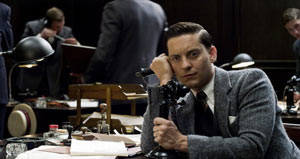
The Great Gatsby does get off to an especially rough start when it comes to content, though. Maguire's Nick narrates the story, telling it to his therapist, and talks about his own growing addiction to alcohol and partying with his cousin Daisy and her husband Tom. One particular party looks like a tamed-down orgy of sorts, with Nick getting more and more drunk during a montage of outrageous partying and everyone's layers of clothing diminishing with the escalation of drinking. It does little to affect the core story, but it's meant to show the lack of control of the "upper class" in the roaring twenties. This leads to Nick attending his neighbor Gatsby's rager which shows plenty of dancing flapper girls and free booze for all. Oddly enough, these scenes are almost all accompanied by modern hip hop and dance tunes, which makes no sense whatsoever at first and obviously is a poor attempt at roping in a younger audience to make the 1922 setting relevant to them. (After watching a featurette about the music, I "get" what Baz was trying to do here, but it's still jarringly out of place in the context of the movie.) But once the film introduces DiCaprio as Gatsby after a prolonged film introduction without him, the story starts to find its legs. Gatsby, as a man, is shrouded in mystery and he soon reveals his past history with Daisy and an obsession with her.
Throughout this tale, we see that Daisy's husband Tom is a real scoundrel. He's unkind, self-absorbed, and makes no qualms about sleeping around. The only girl-on-the-side of his that we get to meet here is Myrtle, the wife of a gas station attendant, and we don't realize--upon meeting her--just how integral her character will be to the story. It's possible that once the film ends, you'll wonder what the movie was really attempting to say, but the mystery driven by the question of "Who is J. Gatsby?" is really what keeps the movie moving forward. But in the end, you realize just how shallow, fickle, and disloyal many of the characters in the film were. The story isn't really anchored by any one wholesome "hero" to root for, and that may be the film's greatest downfall.
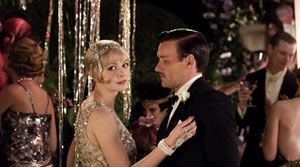
The acting is what singlehandedly saves The Great Gatsby. Everyone turns in their best performances and it keeps the story moving at a swift pace. By the time we get to a beautifully simplistic and classic movie style sequence that "traps" DiCaprio, Maguire, Edgerton, Mulligan and Elizabeth Debicki (who plays Jordan) in a room at The Plaza together on a hot summer day, it's fascinating to watch the tensions mount as the seconds tick by. DiCaprio is wonderfully cast as Gatsby. He's proven time and time again with projects he's starred in that he's got the intensity and wide range of emotions to be a leading man. He can keep you guessing about his character up until a movie's final moments. Baz Luhrmann's direction is also engaging. Previously, he's helmed such visually compelling movies as Moulin Rouge and Romeo + Juliet (only the latter of which I have seen and also found quite depressing), so if you've seen either of those, you'll know what you can expect from Gatsby. While the movie veers wildly into the realm of the surreal on more than just a couple occasions, the cinematography is beautiful and the CG effects aren't always noticeable. (However, they definitely are, too. A line from Maguire about how a horribly Photoshopped photo of DiCaprio looked authentic was particularly laughable.) But despite the acting and direction, the film's conclusion is far from joyous. The ending is positively miserable and, unless that's entirely your cup of tea, it's likely to leave a sour taste in many viewers' mouths.
The content is pretty edgy at times. It's a hard PG-13 when it comes to the themes of promiscuity, heavy drinking, and sexual encounters between the unattached Gatsby and the otherwise married Daisy. There's no nudity, but we do see Gatsby and Daisy in bed together, shirtless under the covers while they're in the act. It's quick and shown mostly in a montage, but it's pretty blatant. Also, it's tough to root for their romance when she's clearly cheating on her husband with Gatsby while she's still married. The story tries to make you sympathetic toward Daisy since Tom is an adulterer, but, to quote an age old cliche, two wrongs don't make a right. There's also a great deal of drinking and partying, and some mild language (including some blasphemy) from a few of the characters (also a couple words noticeable in the modern day rap/urban songs heard in the soundtrack). Finally, we see some blood when a character is hit by a car (and we see their dead body afterward) and a little bit when a character is shot. Thematically, the ending doesn't justify the events that precede it, making it clear that our actions have consequences. And because of that, we're left with a film that's ultimately a tragedy.
Overall, the acting and direction are what make The Great Gatsby worth watching, but the storyline, themes, and grim finale make it a tough one to recommend. Diehard fans of the cast or the book will probably want to check it out, but those looking for lighter entertainment (let alone something wholesome) should pass this one over.
- John DiBiase (reviewed: 8/23/13)
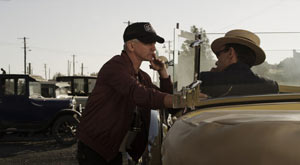
The Greatness of Gatsby (9:14) In the first featurette, we hear from Baz Luhrmann about what sparked his inspiration to make the film, how it came together and how they prepared for it. Here we're treated to some really great early test footage from the first few meetings of Luhrmann and his team with DiCaprio and Maguire.
"Within and Without" with Tobey Maguire (8:41) - Baz explains that he usually has an actor film some reporter-style footage while on set and Tobey took that role this time around. Here we see some of the behind the scenes footage that he filmed while on set.
The Swinging Sounds of Gatsby (12:17) explains the jazz and hip hop marriage used as the soundtrack of the film. Here, Baz talks about how he wanted the audience to hear modern music fused with jazz to relate to the audience how the jazz sound in the 20s was as hip and fresh to them as today's music is for this generation. He talks about the various artist collaborations and how the music runs throughout the film and is interwoven into the score by Craig Armstrong.
The Jazz Age (15:43) is a mini-documentary about the story of the Fitzgeralds. It's pretty depressing, actually. And it frequently quotes portions of Fitzgerald's works, particularly him calling New York his "lost city." It's still a good peek into life in the 20s, however, despite its bleakness.
Razzle Dazzle: The Fashion of the '20s (16:22) - Costume Designer Catherine Martin talks a great deal about the look of the clothing in the film and capturing the look and feel of the 20s for The Great Gatsby. She also runs down her individual partnerships with apparel companies Brooks Brothers, Prada, and Tiffany's and how they contributed to the authenticity and glamour of the movie.
Fitzgerald's Visual Poetry (6:55) Martin and Baz talk about the visual effects used in the film as a storytelling device. It's also here that we learn (for those of us who haven't read the book) that the doctor character who Nick talks to was fabricated for the movie to enable Nick to be able to read portions of the book on screen. They also talk about the visual words on the screen and the usage of 3D for the movie.
Gatsby Revealed is a multi-segmented collection of featurettes with no "play all" option. The first focuses on "Gatsby's Party" (7:12). For this one, they looked to history and Vanity Fair magazine as sources for designing the look of the extras in the film, for which there were over 300 of. "Disconcerting Ride" (4:53) is about the period cars used in the movie. They secured classic car bodies but replaced the guts with modern technology. However, Baz approached none other than Jay Leno who actually owns originals of these cars to record the real sound that the engines of these cars make. Also, it's here that we learn how a good portion of Gatsby's and Nick's city drive was created digitally via green screen. In "Daisy and Gatsby Meet" (7:49), we find out that the inside of Nick's house was filmed on a stage, while the backside of the house was filmed on a mountain side (where the shoot was severely plagued by persistent rain for months) and part of it was brought to a park to be filmed in. "The Plaza" (4:26) is all about the famous NYC hotel and how it played a key role in the film. Finally, "Pool Scene" (5:47) is all about Gatsby's idealism and being a dreamer and how that theme drove the heart of the film.
Deleted Scenes (14:24) - You can view all of the deleted scenes separately or in a "play all" option. The "Baz Intro" features the director talking about how he realized they didn't need the following scenes since it's essentially a movie about Gatsby and his friendship with Nick more than anything. Throughout these "scenes," however, Baz introduces them and then shows snippets of additional cut moments without full-fledged context. "Nick and Jordan" is the first deleted scene, but it's actually a collection of moments that fleshed out their relationship in the movie, including them making out in the back of a moving taxi (1 "d*mn). "Her Voice Was Full of Money," as Baz explains, was cut because Baz thought it seemed too negative of a remark from Gatsby. Before they head to The Plaza, Nick says to Gatsby, "She does love you. Her voice is full of love." Gatsby pauses and then says "No... her voice is full of money," commenting on her upper class position (Actually, I think this would have made sense to leave in). The "Alternate Ending" isn't quite what you might think. The movie still ends the same way, but additionally, we see Gatsby's father coming to visit and, later, a down-and-out Nick runs into Tom on the street.
1926 The Great Gatsby Trailer (1:05) - Oddly enough, the extras close with a 1-minute long trailer for the original 1926 silent film for The Great Gatsby. It's a neat piece of nostalgia, even if it doesn't really fit here.
- John DiBiase, (reviewed: 8/24/13)
Disclaimer: All reviews are based solely on the opinions of the reviewer. Most reviews are rated on how the reviewer enjoyed the film overall, not exclusively on content. However, if the content really affects the reviewer's opinion and experience of the film, it will definitely affect the reviewer's overall rating.
 Reach Records Artist, Trip Lee Drops Double Single Release Ahead of "For Your Glory" Debut Reach Records Artist, Trip Lee Drops Double Single Release Ahead of "For Your Glory" DebutMon, 26 Jan 2026 20:10:00 EST |
 VIVA Worship Releases Its First Studio Album, "Solo El (Live)" VIVA Worship Releases Its First Studio Album, "Solo El (Live)"Mon, 26 Jan 2026 15:40:00 EST |
 Philip Anthony is Set to Release New Lead Single, "No Parts," on January 27 Philip Anthony is Set to Release New Lead Single, "No Parts," on January 27Mon, 26 Jan 2026 15:20:00 EST |
 NEEDTOBREATHE Announces New Album, "The Long Surrender," For Release March 27 NEEDTOBREATHE Announces New Album, "The Long Surrender," For Release March 27Fri, 23 Jan 2026 17:30:00 EST |
 Grace Graber Brings Her Signature Punk Sound to Brandon Lake's "That's Who I Praise" Grace Graber Brings Her Signature Punk Sound to Brandon Lake's "That's Who I Praise"Fri, 23 Jan 2026 17:10:00 EST |
 Warren Peay Releases New Single, "Gimme a Hallelujah," Today Warren Peay Releases New Single, "Gimme a Hallelujah," TodayFri, 23 Jan 2026 17:05:00 EST |
 "House Of Worship" Album Featuring 25 Renowned Artists Releases "House Of Worship" Album Featuring 25 Renowned Artists ReleasesFri, 23 Jan 2026 16:55:00 EST |
 Click here All News Headlines |
Click here All News Headlines |